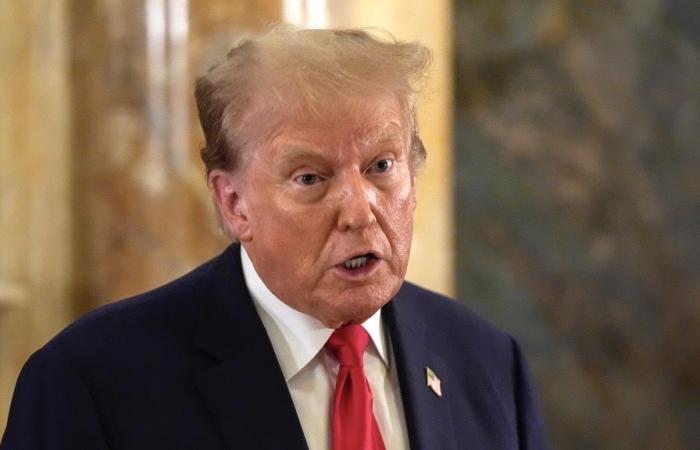
If he wins the elections in November, former President Donald Trump will have the power to make the two federal trials disappear, for electoral obstruction and illegal handling of confidential documents that he still faces. But both the criminal conspiracy trial in Georgia and the fallout from the falsification of business records trial in New York in which he was found guilty on all charges will remain out of reach.
However, Trump could invoke the United States Constitution itself to try to set aside these two processes – at least while he holds the presidency – thanks to the so-called “supremacy clause”.
In fact, Trump’s legal team has already shown that this will be one of its strategies to fight state lawsuits against his client.
Trump attorney Steven Sadow told the judge presiding over the criminal conspiracy trial in Georgia that if Trump wins the election, “under the supremacy clause and his duties as president of the United States, this trial could not take place until after he finishes his term.”
What is the supremacy clause of the United States Constitution?
The rule of law is one of the fundamental pillars underpinning American democracy and is based on the principle that all people are equal before the law, regardless of race, wealth, or position in society.
This principle is what made possible the trial in New York, which made Trump a convicted felon, or that Hunter Biden, the son of current President Joe Biden, was tried and found guilty of crimes related to the illegal possession of a weapon. of fire. Two trials that would not have occurred in countries with less robust rule of law systems.
This, however, does not mean that all laws are equal before people.
Article VI of the Constitution states: “This Constitution and the laws of the United States made in pursuance thereof; and all treaties made, or to be made, under the authority of the United States, shall be the supreme law of the land; and the judges of each state shall be bound by it, notwithstanding any provision to the contrary contained in the Constitution or laws of any state.”
This means that both the Constitution and its amendments constitute the supreme law of the United States, prevailing over any other provision, and that federal laws take precedence over the regulations adopted by the different states.
As explained by former appeals judge and former Tennessee Attorney General Paul Summers, This scale of laws is what is commonly known as the “supremacy clause.”.
How could Donald Trump invoke the supremacy clause?
Even if Trump is sworn in as president on January 20, he will not be able to stop the trial in Georgia, which circumstances indicate will not begin until after the elections, nor will he be able to forgive himself for the guilty verdict that received from the New York jury.
Trump could be forced, for example, to attend lengthy hearings in the trial against him in Fulton County Superior Court in Atlanta. or be prevented from traveling abroad, if the sentence in New York imposes travel restrictions as part of a suspended sentence or house arrest.
However, none of this will prevent him from invoking the supremacy clause to try to postpone these circumstances, if he manages to successfully argue that they create real impediments to the exercise of his duties as president.
A hypothetical future President Trump could argue, for example, that the obligation to be present at the trial in Georgia would interfere with his administration or that New York cannot restrict his ability to leave the country, since Article II of the Constitution grants the president the direction of United States foreign policy, which involves traveling the world.
What has the Supreme Court said about the supremacy clause and the duties of a sitting president?
Summer explains in her article that “the United States Supreme Court makes the final decision on whether a federal law or regulation, a state constitution, or a state law is constitutional or not.”
“The Supreme Court receives between 7,000 and 10,000 appeal requests annually and grants permission to appeal to less than 2% of those requests,” explains the judge. However, cases involving the president of the United States are never rejected by the highest court.
This happened in 2020 when, while still president, Trump unsuccessfully invoked the supremacy clauseby trying to prevent then-Manhattan District Attorney Cyrus Vance Jr. from obtaining his tax returns.
In that case, the majority ruled that the supremacy clause does not grant the president absolute immunity from state criminal subpoenas.
The decision written by Supreme Court Chief Justice John Roberts said that “a properly issued criminal subpoena should not impede the performance of the president’s constitutional duties.”
However, in his dissenting opinion, Justice Samuel Alito predicted the scenario that could emerge should Trump be elected president in November, raising the issue of what would happen if a state criminally tries or convicts a sitting president.
“Could you be imprisoned or face restrictions on your ability to travel? Would he have to set aside his presidential responsibilities to sit on a court? Could his assistants approach him during the trial to whisper urgent matters in his ear? Could the court pause if he needed to speak to a foreign leader,” Alito posed.
Despite Alito’s questions, the Supreme Court had already ruled on the case of a sitting president on trial. In 1997 he decided that a sexual harassment lawsuit against then-President Bill Clinton could move forward.
The decision written by Judge John Paul Stevens said that “a president, like any other official or private citizen, can become distracted or preoccupied by pending litigation,” but did not consider the fact sufficient cause to postpone the trial until Clinton leaves office. .
However, this was a civil trial in federal court and Clinton never invoked the supremacy clause to try to avoid or postpone it.
Although the trial never took place, after the parties reached a settlement, Clinton gave taped testimony on January 17, 1998, marking the first time a sitting president was questioned as a defendant in a court case.
The perjury accusations that arose from that testimony are among the 11 “high crimes and misdemeanors” that led to the impeachment to Clinton that special counsel Ken Starr included in his report to Congress.
This triggered Bill Clinton’s impeachment trial in the House of Representatives and his failed removal from office as president in the Senate between December 1998 and January 1999.
Trump will be sentenced on July 11 after being found guilty of all charges in New York





